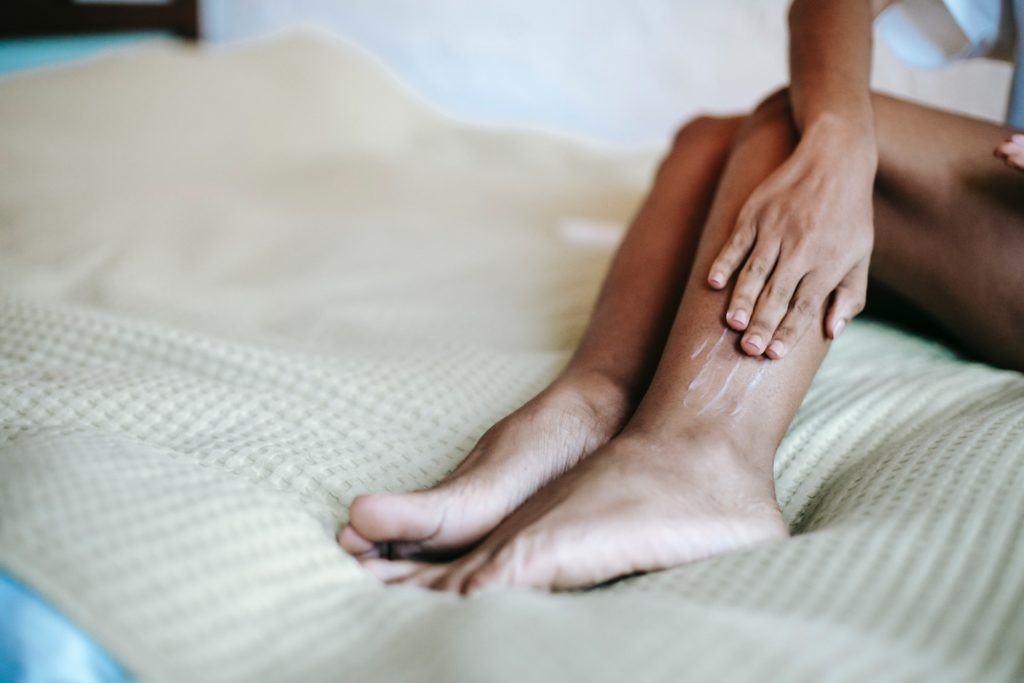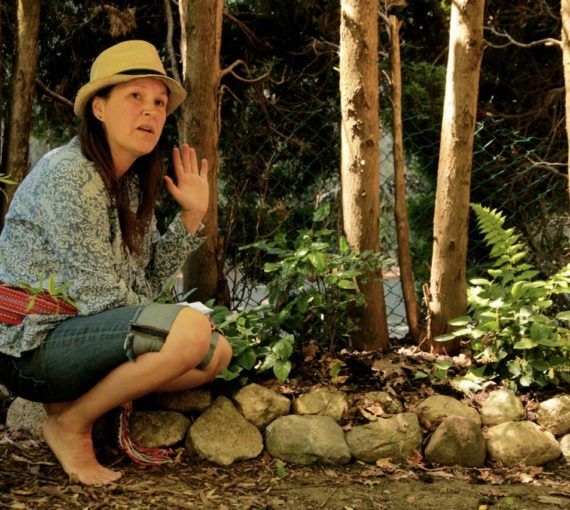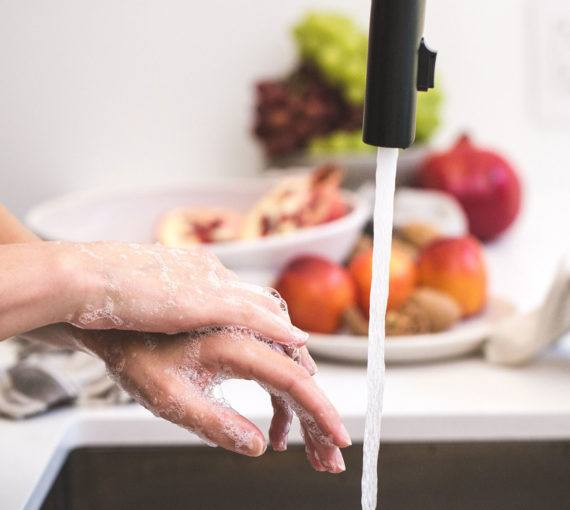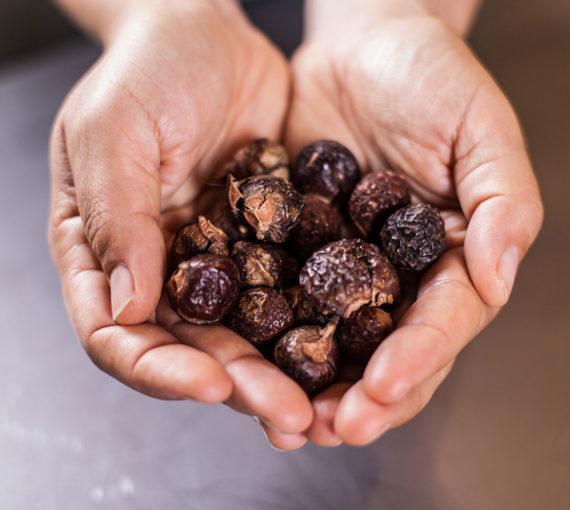
When buying body care products, make the best choices for your budget and body that align with your values and, in the process, rediscover a healthier, interdependent relationship with nature. (Photo: Sora Shimazaki via Pexels)
The cosmetics industry generates up to 120 billion units of plastic packaging per year. Their products are often filled with harmful chemicals and heavy metals that disrupt the natural world and are linked to human health concerns, including cancer.
When buying body care products, make the best choices for your budget and body that align with your values and, in the process, rediscover a healthier, interdependent relationship with nature.
Or — better yet — make your own. (Some ingredients in the recipes below you can grow yourself too.)
David Suzuki often says “What we do to nature, we do to ourselves.” The reverse is also true. What you put in or on your body affects the world around you. How can you best honour that relationship? Practise responsible reciprocity: take care of what takes care of you.
Essential oils
Essential oils are great for aromatherapy, body care and cleaning. But they use a lot of plant material. Their rise in popularity over the last decade has hidden environmental costs.
If you choose to use essential oils:
- Purchase from a local distiller (or learn how to do it yourself)
- Buy organic
- Use with deep care and reverence
- Follow instructions carefully — they’re potent
Use essential oils with caution if you’re pregnant, have other health issues or pets (some essential oils are toxic to pets e.g., peppermint, tea tree, etc.). Be sure they can be applied to skin — some citrus oils may cause reactions when exposed to sunlight. Always try a test patch and omit if sensitive to scents. For more information, check out Airmid Institute.
Recipes to nourish
Aftershave
Shelf life: two months.
- 180 ml (¾ cup) distilled water or sparking mineral water
- 60 ml (¼ cup) witch hazel
- 30 ml (2 tbsp) vegetable glycerin
- 15 ml (1 tbsp) aloe juice or gel
Optional essential oils:
- 3 drops rosemary
- 2 drops clove
- 2 drops bergamot
OR
- 5 drops ylang ylang
Add to a bottle and mellow for two days. Shake before applying.
Did you know?
Vegetable glycerine attracts moisture and cleanses the skin. It’s also hypoallergenic and water soluble.
Body spray
Turn this into scented oil by using two teaspoons of jojoba oil instead of the distilled water and vodka. Shelf life: one month.
- 60 ml (¼ cup) distilled water
- 5 ml (2 tsp.) vodka
- 5 drops grapefruit essential oil
- 5 drops lime essential oil
- 3 drops peppermint essential oil
Add to a spray bottle. Let mellow for a day. Shake before applying.
Anti-dandruff hair rinse
Dandruff can be caused by hormonal disturbances, diet, stress or a fungal infection. Consult a doctor if you’ve had a condition for a long time. For immediate relief, try this rinse daily to control itching and flaking. Shelf life: two months.
- 500 ml (2 cups) water
- 125 ml (½ cup) apple cider vinegar
- 5 drops tea tree essential oil
- 5 drops rosemary essential oil
Mix ingredients. Store in a squirt bottle and shake. Apply after shampooing, massage in and let sit for a few minutes. Then rinse out well.
Did you know?
Apple cider vinegar is packed with natural minerals like magnesium, calcium, iron and phosphorous. It helps restore skin’s acid balance.
Herbal mouthwash
Store this breath freshener in the fridge to extend its shelf life. Discontinue use if you notice any irritation. Shelf life: one to two weeks.
- 2 sprigs fresh rosemary or 15 ml (1 tbsp) dry
- 1 handful fresh spearmint or peppermint or 15 ml (1 tbsp) dry
- 500 ml (2 cups) distilled water
- 30 ml (2 tbsp) vegetable glycerin
Optional:
- 5 drops peppermint essential oil
Steep herbs in boiled water for five minutes. Strain and cool. Stir in vegetable glycerin and essential oil. Pour into glass jar. Shake before use. Swish in mouth and spit out.
Peppermint foot soak
This recipe is so refreshing you’ll be tempted to treat your feet every day! Shelf life: one application.
- 500 ml (2 cups) milk
- 1 handful fresh spearmint or peppermint leaves
- 3-6 sprigs fresh rosemary
- 10 drops peppermint essential oil
Simmer milk and herbs in a saucepan for 10 minutes. Pour mixture into large bowl or tub big enough to soak both feet! Top with warm water and add essential oil. Stir and soak.
Cocoa butter lotion
Solid at room temperature, cocoa butter will melt with your body heat. Shelf life: three months.
- 60 ml (4 tbsp) cocoa butter
- 60 ml (4 tbsp) sweet almond oil
- 60 ml (4 tbsp) grated beeswax
Optional:
- 10 drops of an essential oil of your choice
Melt ingredients together over a double boiler. Pour into an airtight container and cool. Add essential oils last.
Did you know?
Sweet almond oil is easily absorbed by the body, revives the skin and won’t clog pores.
Hand sanitizer
Shelf life: shouldn’t expire
- 60 ml (4 tbsp) pure aloe gel
- 125 ml (1/2 cup) grain alcohol (e.g., vodka) or rubbing alcohol
- 5-8 drops tea tree or thyme essential oil
Optional: add 30 ml (2 tbsp) vegetable glycerin to combat the alcohol’s drying effect.
Mix and store in a squeeze bottle.
Note: Although alcohol-based hand sanitizers work in a pinch, washing hands with soap and water is more effective. For COVID-19, health authorities recommend using hand sanitizer with at least 60 per cent alcohol — but even that won’t work well on visibly dirty hands. Boost this recipe by reducing aloe to 30 ml (2 tbsp) and choosing rubbing alcohol.
We each have a responsibility and role to steward the lands and waters. When we honour our ability to create with our hands, this changes our mindset and the choices we make. It can lead us back to the garden where we can grow some of the plant ingredients we need.
Lori Snyder, Indigenous Metis herbalist and educator

Lori Snyder, Indigenous Metis herbalist and educator
Lori Snyder uses Indigenous teachings to lead people in reconnecting to Earth’s wisdom. She aims to co-create dialogues to reintroduce Indigenous plants in urban landscapes so communities can access local foods and medicines and support collective resilience and healing for all species.


